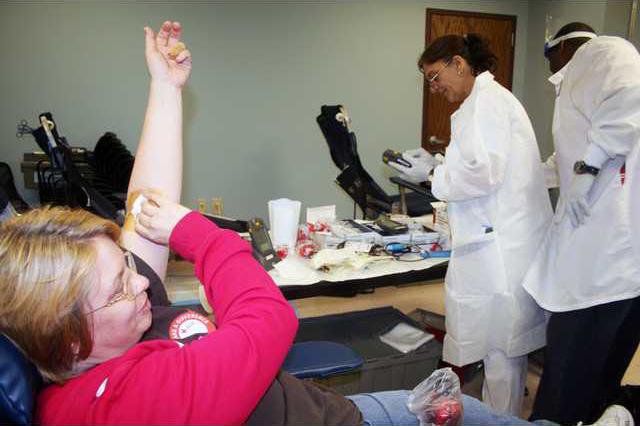Info. box- Why donate?
Approximately ever two seconds, someone in America needs blood.
More than 38,000 blood donations are needed every day to treat patients in need.
Just 38 percent of the population is eligible to give blood, and only a fraction of those people actually do.
The need for blood transfusions is far outpacing actual blood donations.
One blood donation could help save the lives of up to three people.
The Red Cross is the single largest blood supplier in the U.S.
The Red Cross supplies blood products to about 3,000 hospitals nationwide.
Eighty percent of the blood donations made through the Red Cross are at drives set up at community organizations, businesses, schools and churches. The remaining 20 percent are made at blood donation centers.
Information provided by The Basics of Blood Donation American Red Cross brochure
A patient needs a blood transfusion every two seconds in the United States, according to a recent news release from the American Red Cross.
Because of the severe winter weather throughout the eastern part of the nation, more than 14,000 blood and platelet drives were canceled during the past few weeks, blood drive organizers said.
"We have not seen the January supply drop this dramatically in a decade and we need to reverse this now," said Randy Edwards, CEO of the American Red Cross Southern Blood Services Region. "You don’t wait to refuel once you’ve run out of gas. Donating blood or platelets now helps ensure immediate and future patient needs will be met."
To keep up with the demand, Liberty Regional Medical Center, in partnership with the Red Cross, hosts blood drives on the fourth Friday of odd-numbered months.
"On the average, around 15 -20 give, with great response from the public," said Deborah P. Wells, a blood driver coordinator at LRMC. "Blood supply is low right now due to the extreme winter weather and drives being canceled. Because of the shortage, LRMC is not able to get all they need."
On Friday, 27donors dropped by LRMC to give blood. Six others stopped in but could not give for various reasons such as recent antibiotic use, a new tattoo or low hemoglobin. One double-cell donation — a two-unit donation of red blood cells — was given as well, Wells said. The medical center’s goal was to collect 20 units. They collected 22 units during the five-hour drive.
According to the news release, red blood cells have a shelf life of only 42 days and platelets are good for up to five days, which is why donations are in such high demand. Both can be used for trauma victims, including those who have suffered burns or accidents. Blood and platelets can also be used for organ transplant recipients, premature babies and "for patients receiving treatment for leukemia, cancer or other diseases, such as sickle cell disease," the release said.
Michelle Lewalen, a regular donor, stopped to donate early Friday afternoon. Lewalen started donating when she lived in Tennessee in 2004. She heard about a little boy in her community who had a rare form of leukemia and was in need of blood donations.
"I started giving for him," she said of the habit. "I enjoy it. I have O negative — universal. I can give to everybody. I can’t just have anybody’s."
Volunteer Kay Baber signed donors in and gave them complimentary water bottles before they entered the room where workers in white scrubs scooted around a makeshift blood lab.
Donors reclined on blue chairs, chatting with the American Red Cross staffers as they worked. For those who are squeamish around needles, Lewalen encourages them to think of the bigger picture and not focus on the brief prick of pain donors will feel.
"Just look the other way," she said as she picked up a soda after her donation. "Know you’re giving to a good cause."

